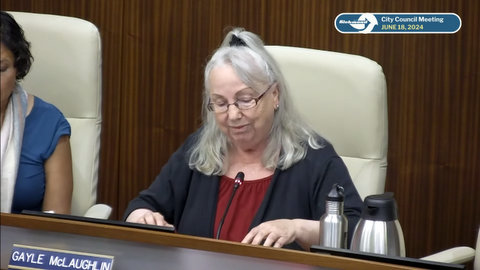
20 Jun Richmond Chevron Tax Will Be on November Ballot

Gayle McLaughlin was on the Richmond City Council in 2008, the last time it put a Chevron tax before voters. On Tuesday, McLaughlin and the council voted to try again. (Screenshot captured by Samantha Kennedy / The CC Pulse)
By Samantha Kennedy
Chevron employees cited concerns about job security and financial support when opposing a proposed tax on the company, holding signs that called it a “job-killing tax.” But supporters, including the Richmond City Council, aren’t buying it.
The Richmond City Council on Tuesday voted to put that tax, which supporters estimate will bring in between $60 million and $90 million in annual revenue to the city, on November’s ballot for voters to consider. If passed, the tax would go into effect July 1, 2025, and provide funding to the city for 50 years.
“We have made so much progress in recent years with releasing the grip of Chevron on Richmond,” said council member Gayle McLaughlin. “And we want to make it clear that that grip of Chevron on Richmond is not going to be regained — not with this City Council and not with the community that is raising those ‘polluters pay’ signs.”
The tax, known as the Richmond Refining Business License Tax Act, comes during the city’s need for revenue, according to supporters, and addresses long-standing environmental and public health concerns that have financial impacts. In the recent draft of the 2024-25 city budget, millions of dollars in requested services will go unfunded for the year.
Supporters refused to allow the divisive issue to come between community members, addressing Chevron employees’ concerns about their jobs and the possible departure of the city’s largest employer.
“We can have health and jobs,” said McLaughlin. “We shouldn’t have to choose between the two.”
Some accused Chevron of fearmongering to gain support.
“This is not a democracy,” said Sue Wilson, a resident and candidate for McLaughlin’s seat this November, referring to the crowd of Chevron employees in the overflow room. “This is corporate overreach.”
Supporters said they stood with employees when they went on strike in 2022, leading to several firings, including that of Mayor Eduardo Martinez’s policy director, that were considered to be retaliatory.
Richmond tried to pass a similar tax in 2008 with Measure T, a tax on Chevron that caused a similar uncertainty for employees and was successfully challenged in court and called unconstitutional. After an appeal by the Richmond City Council at the time, which included McLaughlin, the two reached a settlement. Voters at the time passed Measure T with 51% of the vote.
Communities for a Better Environment and the Asian Pacific Environmental Network, who first proposed the tax, said the flaws associated with Measure T are fixed in the Richmond Refining Business License Tax Act. Kerry Guerin, an attorney for CBE, said that Measure T was successfully challenged because it was a certain type of tax, which the proposed is not, and lacked a mechanism that the proposed tax does have.
Guerin said that the city has already passed similar taxes. In 2020, voters passed Measure U with 72% of the vote for a tax on businesses. Measure U and the proposed Richmond Refining Business License Tax Act are both excise taxes.
Revenue from the tax would go into the city’s general fund, which is not limited in what services it can be used for. Ballot language offers examples of funding for public safety, improving community health and the environment, youth services and city infrastructure.
The next Richmond City Council meeting will be held on Monday, June 24, when the 2024-25 budget is expected to be adopted.






No Comments